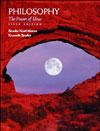| Absolute, the | That which is unconditioned and uncaused by anything else; it is frequently thought of as God, a perfect and solitary, self-caused eternal being that is the source or essence of all that exists but that is itself beyond the possibility of conceptualization or definition.
|
 |
 |
 |
| Absolute Idealism | The early-nineteenth-century school of philosophy that maintained that being is the transcendental unfolding or expression of thought or reason.
|
 |
 |
 |
| Absolute Idealists | Fichte, Johann Gottlieb; Hegel, Georg Wilhelm Friedrich; Shelling, Friedrich Wilhelm Joeseph von.
|
 |
 |
 |
| Arthur Shopenhauer | Held that the world is structured and driven by will.
|
 |
 |
 |
| Conceptualism | The theory that universals are concepts and exist only in the mind.
|
 |
 |
 |
| Copernican revolution in philosophy | A new perspective in epistemology, introduced by Immanuel Kant, according to which the objects of experience must conform in certain respects to our knowledge of them.
|
 |
 |
 |
| David Hume | Held that there is no metaphysical knowledge and maintained that knowledge is limited to what we experience. He summoned powerful arguments to question our supposed knowledge of the self, causality, God, and the external world.
|
 |
 |
 |
| Ding-an-sich | German for "thing-in-itself" a thing as it is independent of any consciousness of it.
|
 |
 |
 |
| Georg Hegel | Was the premier exponent of Absolute Idealism. He rejected the concept of "the thing-in-itself" and held that all reality is the expression of thought or reason.
|
 |
 |
 |
| Idealism | The doctrine that only what is mental (thought, consciousness, perception) exists and that so-called physical manifestations of things are manifestations of mind or thought.
|
 |
 |
 |
| Immanuel Kant | Believed the mind imposes a certain form and order on experiencable objects. He held that there can be no knowledge of things "as they are in themselves," independent of experience.
|
 |
 |
 |
| Materialism | The theory that only physical entities exist, and that so-called mental things are manifestations of an underlying physical reality.
|
 |
 |
 |
| Noumena | In the philosophy of Immanuel Kant, things as they are in themselves independent of all possible experience of them.
|
 |
 |
 |
| Phenomena | In Kant's philosophy, objects as experiences and hence as organized and unified by the categories of the understanding and the forms of space and time; things as they appear to us or, alternatively, the appearances themselves.
|
 |
 |
 |
| Realism | The theory that the real world is independent of the mind.
|
 |
 |
 |
| Thing-in-itself | English for Ding-an-sich a thing as it is independent of any consciousness of it.
|



 2002 McGraw-Hill Higher Education
2002 McGraw-Hill Higher Education